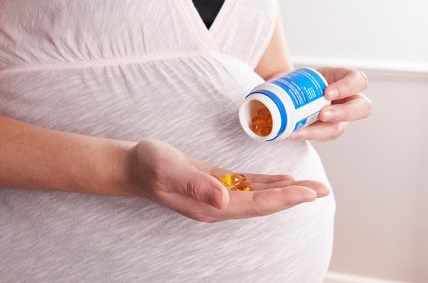Researchers Suggest That Docosahexaenoic Acid And Eicosapentaenoic Acid Be Made Mandatory Supplements For Pregnant Women
Nikhil Prasad Fact checked by:Thailand Medical News Team Jul 04, 2024 9 months, 2 weeks, 3 days, 18 hours ago
Supplements: During pregnancy, expectant mothers often focus on improving their diets to ensure their babies get all the necessary nutrients. A crucial part of this nutritional puzzle is omega-3 fatty acids, particularly Docosahexaenoic Acid (DHA) and Eicosapentaenoic Acid (EPA). These essential fatty acids, primarily found in seafood and some microalgae, are vital for both maternal and fetal health. But why are these nutrients so important, and should they be mandatory supplements during pregnancy? Researchers from Romania conducted a study review that explores the importance of DHA and EPA
Supplements during pregnancy.
 Researchers Suggest That Docosahexaenoic Acid And Eicosapentaenoic
Researchers Suggest That Docosahexaenoic Acid And Eicosapentaenoic
Acid Be Made Mandatory Supplements For Pregnant Women
What Are Omega-3 Fatty Acids?
Omega-3 fatty acids are a group of essential fats that our bodies cannot produce on their own, meaning we must get them from our diet. DHA and EPA, the most beneficial types of omega-3s, are known for their role in brain development and reducing inflammation. They are primarily found in fatty fish like salmon, mackerel, and sardines, as well as in certain types of algae.
Benefits for Baby: Brain and Eye Development
Research has shown that DHA and EPA are critical for the neurological development of the fetus. These fatty acids are found in high concentrations in the brain and retina, contributing to better language skills, memory, attention, hand-eye coordination, and sleep patterns in infants. Babies born to mothers with higher DHA and EPA levels tend to have better visual acuity and cognitive development.
Reducing the Risk of Preterm Birth and Preeclampsia
Omega-3s may also play a role in reducing the risk of preterm birth (babies born before 37 weeks) and preeclampsia (a pregnancy complication characterized by high blood pressure). Studies suggest that omega-3 supplementation can help maintain pregnancy to full term and reduce inflammation, which is often linked to these conditions.
Maternal Health: Beyond Pregnancy
For mothers, the benefits of omega-3s extend beyond pregnancy. These fatty acids are known to reduce the risk of postpartum depression, a common and serious condition that can affect new mothers. They also have cardiovascular benefits, helping to lower the risk of heart disease, which is a significant concern during and after pregnancy.
Sources of Omega-3s: Food and Supplements
While seafood is the best source of DHA and EPA, not all pregnant women consume enough fish to meet their omega-3 needs. This is where supplements come in handy. Many prenatal vitamins now include DHA and EPA to ensure that mothers and their babies get enough of these essential nutrients. However, it's essential to choose high-quality supplements that are free from contaminants like mercury.
Safety and Dosage Recommendations
;
The recommended daily intake of DHA and EPA for pregnant women varies. Generally, an intake of at least 200-300 mg of DHA per day is suggested. It's also recommended that women start omega-3 supplementation before 20 weeks of pregnancy to maximize benefits. Fish oil supplements are considered safe, and most are purified to remove harmful substances.
Real-Life Impact: Research and Studies
Numerous studies have highlighted the positive impact of omega-3s during pregnancy. For instance, a large-scale study involving 11,875 women found that higher seafood consumption during pregnancy was linked to better developmental outcomes in children. Another study showed that DHA supplementation improved mental performance in children at four years old.
Controversies and Conflicting Data
Despite the substantial evidence supporting the benefits of omega-3s, some studies present conflicting data. For example, a large study published in JAMA found no significant difference in cognitive and language development between children of mothers who took DHA supplements and those who didn't. These discrepancies highlight the need for more research to fully understand the extent of omega-3 benefits.
Practical Tips for Expectant Mothers
-Incorporate Seafood: Aim to include 8-12 ounces of low-mercury fish in your diet each week.
-Choose Quality Supplements: If you don't consume enough fish, consider taking a high-quality omega-3 supplement.
-Consult Your Doctor: Always discuss any supplements with your healthcare provider to ensure they are safe and appropriate for your needs.
-Balance Your Diet: Alongside omega-3s, maintain a well-rounded diet rich in other essential nutrients.
Conclusion: A Nutritional Necessity?
Omega-3 fatty acids, particularly DHA and EPA, offer numerous benefits for both mother and baby during pregnancy. They support fetal brain and eye development, reduce the risk of preterm birth and preeclampsia, and improve maternal health by lowering the risk of postpartum depression and cardiovascular issues. While not all studies agree on the extent of these benefits, the overall evidence suggests that omega-3s are a valuable part of prenatal nutrition. Therefore, ensuring adequate intake through diet or supplements is a wise choice for expectant mothers.
The study review was published in the peer reviewed journal: Biomedicines.
https://www.mdpi.com/2227-9059/12/7/1471
For the latest about
Supplements, keep on logging to Thailand Medical News.
Read Also:
https://www.thailandmedical.news/news/reproductive-medicine-study-warns-that-men-wanting-to-be-fathers-should-abstain-from-alcohol-for-at-least-three-months-prior-to-conceiving
https://www.thailandmedical.news/news/pregnancy-and-covid-19-study-shows-choline-supplements-could-help-pregnant-women-reduce-negative-effects-of-covid-19-in-newborns
